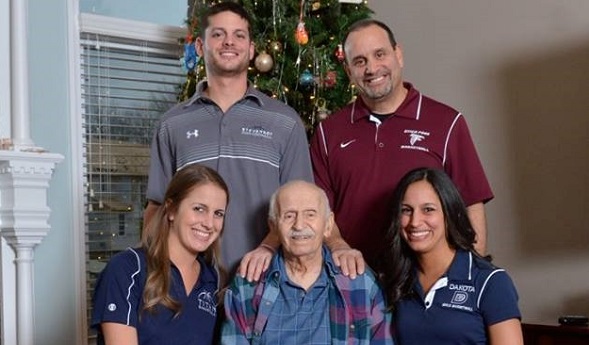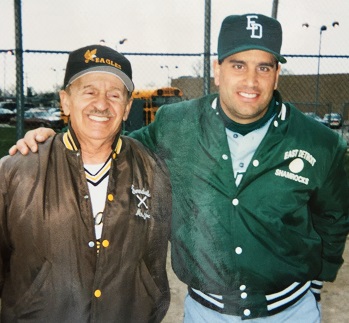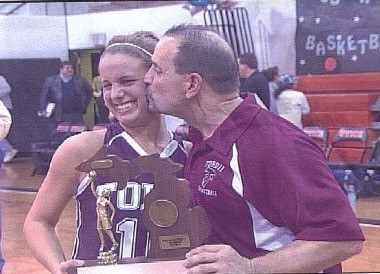
Joseph Coaching Tree Continues to Bloom
By
Tom Markowski
Special for Second Half
May 17, 2017
STERLING HEIGHTS – Annis Joseph died last year at the age of 92, and the former baseball coach, husband, father and grandfather supplied his extended family stories to tell that will last a lifetime.
 Ryan Joseph is one of his grandsons and forever in debt to the person who created such a love for sports, whether playing or coaching, for so many members of his family.
Ryan Joseph is one of his grandsons and forever in debt to the person who created such a love for sports, whether playing or coaching, for so many members of his family.
One such story touched Ryan at an early age and represents a chord that connects this family through more than 60 years of coaching.
Ryan Joseph, 29, is in his second season as the varsity baseball coach at Utica Ford. Back in the mid-to-late 1990s he watched East Detroit’s baseball team, coached by his father, Matt, play against Ferndale, coached by his grandfather.
“My dad ran a squeeze play to win the game,” Ryan said. “It was a play my grandfather used all the time, and my dad learned from that. The newspapers were there, taking pictures afterward of my dad and my grandfather together. That was the first memory I have of my grandfather.”
Annis Joseph coached for 53 years, and most of his time as a coach was spent on a baseball diamond in Ferndale. He and his wife, Josephine, raised seven children, four boys and three girls, and all of the boys played a variety of sports throughout high school. All also eventually became coaches.
Matt Joseph is the seventh child, and what his father started in the 1940s, coaching and working with the youth in the area, will continue for years to come.
Matt Joseph and his wife, Darlene, have three children, and all three are coaches. Matt is in his 32nd season. He’s currently the head coach of two varsity sports at Utica Ford, softball and girls basketball. He’s also a counselor at the school.
“Sports has always been a big part of my life,” Matt said. “I love it. I love coaching. I love working with young adults, and the camaraderie you build with coaches and referees. (Being a coach) has helped me in my life. You have to have patience (to coach). It’s becoming a family thing.”
His son is not only the baseball coach at Ford, but he just completed his first season assisting his father with the girls basketball team. Ryan started coaching in 2010 at Jeanette Junior High in Sterling Heights working with the eighth grade boys basketball team. He also coached freshmen baseball at Sterling Heights Stevenson for five seasons before going over to Ford. Ryan also coached football for four seasons including one at the freshmen level at Stevenson. This season he started coaching a 13-and-under summer league baseball team as well.
Matt’s eldest daughter, Emily, 27, just completed her fifth season as the girls junior varsity basketball coach at Macomb Dakota. Emily is also a mathematics teacher at the school.
The Josephs’ third child, Teresa, 25, just completed her third season as the girls varsity basketball coach at Grand River Prep in Kentwood near Grand Rapids. Teresa also teaches math at the school.
 Matt, 54, began his career in education as a math teacher. He graduated from Madison Heights Bishop Foley in 1981, and he said there was a math teacher he had as a junior who sparked his interest in the subject.
Matt, 54, began his career in education as a math teacher. He graduated from Madison Heights Bishop Foley in 1981, and he said there was a math teacher he had as a junior who sparked his interest in the subject.
His children followed his lead, all except his son who chose a slightly different path. Ryan is a French teacher.
One of Matt’s brothers, Mike, switched careers after a spell. He quit his job, went back to college and earned his teaching certificate. Mike teaches at Hartland and is the girls varsity golf coach there.
It’s in the blood.
“I knew in high school I wanted to be a teacher,” Matt Joseph said. “I love what I do. I wake up and it’s not a chore going to work. I knew I wasn’t going to make a lot of money. Looking back, I wouldn’t change a thing.”
The other male offspring of Annis and Josephine are Dave, 64, and Ray, 63. Mike is the eldest son at age 69.
Dave and Ray spent a majority of their careers coaching girls basketball. Dave spent the last 12 seasons as the varsity coach at Bishop Foley before recently resigning. Ray was Dave’s junior varsity coach the past 21 seasons.
“My dad started it all,” Dave said. “He owned Annis Market on 9 Mile (Road) and Hilton in Ferndale. He coached federation ball, and each team had to have a sponsor. The market was ours for a number of years. Growing up we would go along with Mom and Dad to the ball field. My dad coached, and my mom would sell concessions. So we were in sports all of our lives. We all started at a very young age. My dad coached me until I was 18. It was fun. Those were great times.”
Dave Joseph said what he’ll miss most is watching the improvement of the players coinciding with the improvement of the teams. What happened in between was what adults would call the foolishness of youth, what Dave termed ‘giddiness’.
Matt has had the most success. He started coaching at the varsity level in 1990 at East Detroit as he ran both the baseball and boys basketball programs. From 1996-2000 he coached three varsity teams adding girls basketball to the list. After the 2000-01 school year, Matt left East Detroit and accepted a counseling position at Ford. He remained the baseball coach at East Detroit, and in 2004 he was hired as the girls varsity basketball coach at Ford.
It was during this time that Ford’s baseball coach Dan Barnabo switched over to coaching softball. It took Barnabo time to convince Matt to make the same switch.
 “He convinced me to help him,” Matt said. “At first I said, ‘No, I’m a baseball guy.’ I finally did it. Then we switched again. (In 2011) I became the head coach and Dan’s my assistant. And he still is.”
“He convinced me to help him,” Matt said. “At first I said, ‘No, I’m a baseball guy.’ I finally did it. Then we switched again. (In 2011) I became the head coach and Dan’s my assistant. And he still is.”
As a school, Ford has never been to an MHSAA Softball Final, but Matt took his Falcons to the program’s first Semifinal in 2014 as Ford lost in Division 1 to Portage Central, 1-0.
Ford is 20-4 this season, ranked No. 6 in the state coaches poll, and could play No. 2 Macomb Dakota, last season’s Division 1 runner-up, in a District Final.
Dave Joseph’s teams didn’t make it as far as Matt’s in softball, but Dave’s 2013-14 Bishop Foley team did win the Detroit Catholic League C-D title.
And success is measured in many more ways than District or league titles. As a person, Matt Joseph is content. He’s lived a good and happy life and is proud of where he came from and the guidance he and his wife gave their three children.
“I just believed in what I was doing,” he said. “And my kids did all the things I did when I was growing up. They came with me to East Detroit as a water boy or water girl and a bat boy. It’s what we did as a family. And they all played at least two varsity sports.”
Evidently Annis Joseph sold more than fruits and vegetables at his market. He was able to convince many in his family that by participating in athletics, and becoming passionate about them, those experiences could lead one to riches not measured in dollars and cents, but where commitment and family are their own rewards.
 Tom Markowski is a columnist and directs website coverage for the State Champs! Sports Network. He previously covered primarily high school sports for the The Detroit News from 1984-2014, focusing on the Detroit area and contributing to statewide coverage of football and basketball. Contact him at [email protected] with story ideas for Oakland, Macomb and Wayne counties.
Tom Markowski is a columnist and directs website coverage for the State Champs! Sports Network. He previously covered primarily high school sports for the The Detroit News from 1984-2014, focusing on the Detroit area and contributing to statewide coverage of football and basketball. Contact him at [email protected] with story ideas for Oakland, Macomb and Wayne counties.
PHOTOS: (Top) One branch of the coaching Josephs surrounds grandfather Annis, clockwise from top left, Ryan, Matt, Emily and Teresa. (Middle) Annis, left, and Matt Joseph when Annis was coaching at Ferndale and Matt at East Detroit. (Below) Matt Joseph celebrates a basketball championship with daughter Teresa during her playing days. (Photos courtesy of the Joseph family).

Health & Safety: A Look Back, Gallop Ahead
By
John E. (Jack) Roberts
MHSAA Executive Director, 1986-2018
August 7, 2015
By Jack Roberts
MHSAA executive director
We are just completing year six of eight during which we have been addressing the four important health and safety issues that, for ease of conversation, we call the “Four Hs.”
During the 2009-10 and 2010-11 school years, our focus was on Health Histories. We made enhancements in the pre-participation physical examination form, stressing the student’s health history, which we believe was and is the essential first step to participant health and safety.
During the 2011-12 and 2012-13 school years, our focus was on Heads. We were an early adopter of removal-from-play and return-to-play protocols, and our preseason rules/risk management meetings for coaches included information on concussion prevention, recognition and aftercare.
Without leaving that behind, during the 2013-14 and 2014-15 school years, our focus was on Heat – acclimatization. We adopted a policy to manage heat and humidity – it is recommended for regular season and it’s a requirement for MHSAA tournaments. The rules/risk management meetings for coaches during these years focused on heat and humidity management.
At the mid-point of this two-year period, the MHSAA adopted policies to enhance acclimatization at early season practices and to reduce head contact at football practices all season long.
Without leaving any of the three previous health and safety “H’s” behind, during the 2015-16 and 2016-17 school years, our focus will be on Hearts – sudden cardiac arrest and sudden cardiac death.
Coinciding with this emphasis is the requirement that all high school level, varsity level head coaches be CPR certified starting this fall. Our emphasis will be on AEDs and emergency action plans – having them and rehearsing them.
On Feb. 10, bills were introduced into both the U.S. Senate and House of Representatives, together called the “Safe Play Act (see below),” which addressed three of the four health and safety “H’s” just described: Heat, Hearts and Heads.
For each of these topics, the federal legislation would mandate that the director of the Centers for Disease Control develop educational material and that each state disseminate that material.
For the heat and humidity management topic, the legislation states that schools will be required to adopt policies very much like the “MHSAA Model Policy to Manage Heat and Humidity” which the MHSAA adopted in March of 2013.
For both the heart and heat topics, schools will be required to have and to practice emergency action plans like we have been promoting in the past and distributed to schools this summer.
For the head section, the legislation would amend Title IX of the 1972 Education Amendments and eliminate federal funding to states and schools which fail to educate their constituents or fail to support students who are recovering from concussions. This support would require multi-disciplinary concussion management teams that would include medical personnel, parents and others to provide academic accommodations for students recovering from concussions that are similar to the accommodations that are already required of schools for students with disabilities or handicaps.
This legislation would require return-to-play protocols similar to what we have in Michigan, and the legislation would also require reporting and recordkeeping that is beyond what occurs in most places.
This proposed federal legislation demonstrates two things. First, that we have been on target in Michigan with our four Hs – it’s like they read our playbook of priorities before drafting this federal legislation.
This proposed federal legislation also demonstrates that we still have some work to do.
And what will the following two years – 2017-18 and 2018-19 – bring? Here are some aspirations – some predictions, but not quite promises – of where we will be.
First, we will have circled back to the first “H” – Health Histories – and be well on our way to universal use of paperless pre-participation physical examination forms and records.
Second, we will have made the immediate reporting and permanent recordkeeping of all head injury events routine business in Michigan school sports, for both practices and contests, in all sports and at all levels.
Third, we will have added objectivity and backbone to removal from play decisions for suspected concussions at both practices and events where medical personnel are not present; and we could be a part of pioneering “telemedicine” technology to make trained medical personnel available at every venue for every sport where it is missing today.
Fourth, we will have provided a safety net for families who are unable to afford no-deductible, no exclusion concussion care insurance that insists upon and pays for complete recovery from head injury symptoms before return to activity is permitted.
We should be able to do this, and more, without judicial threat or legislative mandate. We won’t wait for others to set the standards or appropriate the funds, but be there to welcome the requirements and resources when they finally arrive.
Safe Play Act — H.R.829
114th Congress (2015-2016) Introduced in House (02/10/2015)
Supporting Athletes, Families and Educators to Protect the Lives of Athletic Youth Act or the SAFE PLAY Act
Amends the Public Health Service Act to require the Centers for Disease Control and Prevention (CDC) to develop public education and awareness materials and resources concerning cardiac health, including:
- information to increase education and awareness of high risk cardiac conditions and genetic heart rhythm abnormalities that may cause sudden cardiac arrest in children, adolescents, and young adults;
- sudden cardiac arrest and cardiomyopathy risk assessment worksheets to increase awareness of warning signs of, and increase the likelihood of early detection and treatment of, life-threatening cardiac conditions;
- training materials for emergency interventions and use of life-saving emergency equipment; and
- recommendations for how schools, childcare centers, and local youth athletic organizations can develop and implement cardiac emergency response plans.
Requires the CDC to: (1) provide for dissemination of such information to school personnel, coaches, and families; and (2) develop data collection methods to determine the degree to which such persons have an understanding of cardiac issues.
Directs the Department of Health and Human Services to award grants to enable eligible local educational agencies (LEAs) and schools served by such LEAs to purchase AEDs and implement nationally recognized CPR and AED training courses.
Amends the Elementary and Secondary Education Act of 1965 to require a state, as a condition of receiving funds under such Act, to certify that it requires: (1) LEAs to implement a standard plan for concussion safety and management for public schools; (2) public schools to post information on the symptoms of, the risks posed by, and the actions a student should take in response to, a concussion; (3) public school personnel who suspect a student has sustained a concussion in a school-sponsored activity to notify the parents and prohibit the student from participating in such activity until they receive a written release from a health care professional; and (4) a public school's concussion management team to ensure that a student who has sustained a concussion is receiving appropriate academic supports.
Directs the National Oceanic and Atmospheric Administration to develop public education and awareness materials and resources to be disseminated to schools regarding risks from exposure to excessive heat and humidity and recommendations for how to avoid heat-related illness. Requires public schools to develop excessive heat action plans for school-sponsored athletic activities.
Requires the CDC to develop guidelines for the development of emergency action plans for youth athletics.
Authorizes the Food and Drug Administration to develop information about the ingredients used in energy drinks and their potential side effects, and recommend guidelines for the safe use of such drinks by youth, for dissemination to public schools.
Requires the CDC to: (1) expand, intensify, and coordinate its activities regarding cardiac conditions, concussions, and heat-related illnesses among youth athletes; and (2) report on fatalities and catastrophic injuries among youths participating in athletic activities.

